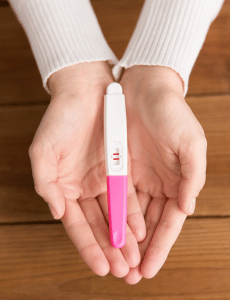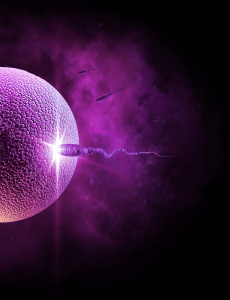Spotting After Period Ended – Could I Be Pregnant?
If you are experiencing spotting or light bleeding after your period- it may be something called implantation bleeding: a sign that you are pregnant.
There are also other causes of spotting between periods that are not caused by pregnancy. Read on to find out more.
In this article:
- What is Implantation Bleeding?
- What Does Implantation Bleeding Look Like?
- The Difference Between Spotting and Your Mnestrual Period
- How soon after Implantation Bleeding Can I Take A Pregnancy Test?
- Other Causes of Bleeding between Periods
- When Should I Contact My Doctor?
What is Implantation Bleeding?

Every month (approximately, if you have a regular menstrual cycle), your body prepares you for pregnancy: ovulation occurs (where a mature egg is released into a fallopian tube), your uterine lining thickens, and your hormones soar, and your body prepares to maintain the thickened uterine lining with the hormonal changes.
If fertilisation does not occur, the egg is reabosrbed by the body . Two weeks later, the thickened uterine lining sheds and exits through the vagina as vaginal bleeding. This shedding of the uterine lining is your menstrual period.
If the egg is fertilized within the fallopian tubes, then the thickened uterine lining is maintained by the hormone progesterone- which rises more and more as time after the fertilisation progresses.
The fertilised egg then travels down the fallopian tubes, and into the uterus. It is there that the fertilised egg implants itself into the uterine lining. Through this connection, the fertilised egg will receive the nutrients and blood supply it needs to grow.
When the fertilised egg implants into the uterine lining, it can cause some blood vessels in the uterine lining to break, causing light spotting. This is called implantation bleeding and it typically occurs between 10 and 14 days after conception.
Implantation bleeding is a sign of pregnancy and it is often one of the first pregnancy symptoms that women experience. It may also be accompanied by mild cramping: called implantation cramping.
Implantation bleeding is one of many potential early pregnancy symptoms. Between 15 and 25 percent of all women experience implantation bleeding, following implantation. You can see a full list of the other symptoms of pregnancy which you may experience below.
Other Symptoms of Early Pregnancy / Implantation:
- Fatigue
- Breast tenderness
- Sore nipples
- Nausea with or without vomiting
- Heightened sense of smell
- Bloating
- Constipation
- Mild cramping (implantation cramping)
The Difference Between Spotting and Your Menstrual Period
If your period has recently ended, and you are now experiencing more vaginal bleeding, it may be a sign that implantation has occured. However, it may also be that you are having an irregular period this month- which can be caused by a variety of things, such as hormonal changes, weight loss, extreme physical exercise, stress and more.
Here is how you can tell the difference…
Your Menstrual Period

- Colour – Normal vaginal bleeding caused by your period usually starts off pink or brown in colour at the beginning of your period, and, as the period progresses, the colour of the period blood becomes a crimson red. At the end of your period, the colour will change back to brown or pink.
- Flow – Your menstrual period usually starts off light, before becoming much heavier in flow.
- Cramping – Alongside your menstrual bleeding, you may experience painful cramps, which last for a while.
- Duration – Your menstrual period usually lasts between 4 and 7 days, which is longer than implantation bleeding.
- Consistency – Your menstrual period starts off light, and progressively gets heavier, before getting lighter again towards the end of the period.
Implantation Bleeding
- Colour – Implantation bleeding is light pink or brown- or maybe pinkish-brown- in colour.
- Flow – Implantation bleeding is much lighter than a normal period- with there only being just a few drops of blood in your underwear, or streak of blood or pinkish-brown discharge when you wipe.
- Cramping – Alongside the implantation bleeding, you may experience some mild cramping. This mild cramping is otherwise known as implantation cramping and lasts between one and three days.
- Duration – Implantation bleeding lasts between just 1 and 3 days.
- Consistency – Implantation bleeding is not constant bleeding- but rather on-off spotting, unlike your menstrual period.
Do you have the following combination of symptoms?: Late Period, Negative Pregnancy Test & White Discharge. Click the link to find out why!
How soon after Implantation Bleeding Can I Take A Pregnancy Test?

Around four to five days after implantation bleeding, your hCG levels are high enough to be detected in a blood test.
However, for home pregnancy tests, it takes a little bit longer: with your hCG levels not being high enough until up to 7 days after implantation bleeding occurs.
Other Causes of Bleeding between Periods
We have discussed that implantation can cause light bleeding between periods, however, there are also several other causes of this irregular bleeding:
Polycystic Ovary Syndrome (PCOS)
Polycystic Ovary Syndrome (PCOS) is a common condition which affects how your ovaries function. The three main associated issues that come with PCOS are as follows:
- Irregular periods
- Excess androgen (male) hormones which can cause excess body or facial hair
- Polycystic ovaries (enlarged ovaries which include fluid-filled sacs that surround the eggs)
Ectopic Pregnancy
Ectopic pregnancies (pregnancies which grow outside of the womb- usually in one of the fallopian tubes) can cause bleeding between periods, in addition to the following symptoms:
- Pelvic or lower abdominal pain on one side
- Pain in the tip of your shoulder
- Vaginal bleeding or watery brown discharge
- Discomfort when urinating or having a bowel movement
- A missed period
If you believe that you may be having an ectopic pregnancy, you should contact your doctor, as it is a medical emergency.
Birth Control Pill
Birth control pills, or emergency contraception such as the morning after pill, can cause vaginal bleeding between periods.
Bleeding experienced between periods whilst on the birth control pill is called breakthrough bleeding.
Vaginal Dryness
Vaginal dryness can cause vaginal bleeding between periods. Vaginal dryness is often caused by perimenopause. This is because, during perimenopause, your vaginal mucosa gets thinner- due to a lack of estrogren- making it more vulnerable to irritation which can cause bleeding.
Sexual intercourse can cause light vaginal bleeding if you are experiencing vaginal dryness.
Cancer
In rare cases, vaginal bleeding between periods may be caused by cancer. Forms of cancer that can cause vaginal bleeding between periods include:
- Cervical cancer
- Vaginal cancer
- Uterine cancer
- Ovary cancer
Irregular Periods
Irregular periods or menstrual cycles may also be the cause of the irregular bleeding that occurs after what you thought was the end of your period.
Between 9 and 14 percent of women experience irregular periods. Irregular periods can be caused by a variety of things, such as hormone imbalances, stress, being underweight, extreme exercise and more.
Ovulation

Ovulation is the process where an ovary releases a mature egg into one of the fallopian tubes, ready to be fertilized.
Ovulation can cause a light bleeding or spotting: called ovulation bleeding.
Ovulation bleeding is caused by the sudden hormonal changes during ovulation: specifically, the drop in estrogen levels.
It typically lasts between one and two days within the ovulation window.
If you are spotting after your period ends, it is likely to be due to ovulation bleeding.
Pelvic Inflammatory Disease (PID)
Pelvic Inflammatory Disease is an infection of the female reproductive system, which includes the fallopian tubes, uterus and ovaries.
Pelvic inflammatory disease is rare, with only 4.4% of sexually experienced women between the ages of 18 and 44 suffering from the condition.
Symptoms of PID include:
- Pain when urinating
- Bleeding between periods and after sexual intercourse
- Pain around the pelvis or lower abdominal pain
- Heavy periods
- Painful periods
- Abnormal vaginal discharge
- Discomfort or paind during sex that is felt deep inside the pelvis
Rare symptoms of PID include:
- Nausea and vomiting
- A fever
- Severe tummy pain
If you experience any symptoms of PID, you should consult a medical professional, who will help to diagnose the issue. If you are experiencing severe pain, you should go straight the GP or A&E.
Irregular Periods
The title sums it up! If you have irregular menstrual cycles, or periods that vary in length each month or regularly missed periods, then spotting “in between periods” may be a normal symptom for you.
When Should I Contact My Doctor?
If you are concerned about your vaginal bleeding, and are experiencing abnormal vaginal bleeding or abnormal uterine bleeding, you should contact your doctor as it should not be ignored.
It is best to seek medical advice, in order to rule out any harmful causes.
Support
Below are some links which you can access for more information about support about the medical conditions or infections discussed in the sections above:
Polycystic Ovary Syndrome (PCOS): https://www.pcosaa.org/
Pelvic Inflammatory Disease (PID): https://www.nhs.uk/conditions/pelvic-inflammatory-disease-pid/
Cancer: https://www.macmillan.org.uk/
My name is Louise and I am the Digital Marketing and Administrative Assistant at MyBump2Baby. I have been writing in the parenting niche for over 2 years specialising in fertility, pregnancy, baby and baby name support articles.


















